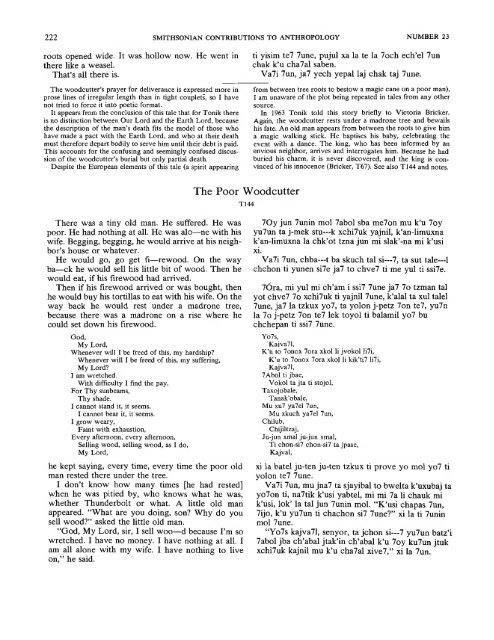PDF (Lo-Res) - Smithsonian Institution Libraries
PDF (Lo-Res) - Smithsonian Institution Libraries
PDF (Lo-Res) - Smithsonian Institution Libraries
Create successful ePaper yourself
Turn your PDF publications into a flip-book with our unique Google optimized e-Paper software.
222 SMITHSONIAN CONTRIBUTIONS TO ANTHROPOLOGY NUMBER 23<br />
roots opened wide. It was hollow now. He went in<br />
there like a weasel.<br />
That's all there is.<br />
The woodcutter's prayer for deliverance is expressed more in<br />
prose lines of irregular length than in tight couplets, so I have<br />
not tried to force it into poetic format.<br />
It appears from the conclusion of this tale that for Tonik there<br />
is no distinction between Our <strong>Lo</strong>rd and the Earth <strong>Lo</strong>rd, because<br />
the description of the man's death fits the model of those who<br />
have made a pact with the Earth <strong>Lo</strong>rd, and who at their death<br />
must therefore depart bodily to serve him until their debt is paid.<br />
This accounts for the confusing and seemingly confused discussion<br />
of the woodcutter's burial but only partial death.<br />
Despite the European elements of this tale (a spirit appearing<br />
There was a tiny old man. He suffered. He was<br />
poor. He had nothing at all. He was alo—ne with his<br />
wife. Begging, begging, he would arrive at his neighbor's<br />
house or whatever.<br />
He would go, go get fi—re wood. On the way<br />
ba—ck he would sell his little bit of wood. Then he<br />
would eat, if his firewood had arrived.<br />
Then if his firewood arrived or was bought, then<br />
he would buy his tortillas to eat with his wife. On the<br />
way back he would rest under a madrone tree,<br />
because there was a madrone on a rise where he<br />
could set down his firewood.<br />
God,<br />
My <strong>Lo</strong>rd,<br />
Whenever will I be freed of this, my hardship?<br />
Whenever will I be freed of this, my suffering,<br />
My <strong>Lo</strong>rd?<br />
I am wretched.<br />
With difficulty I find the pay,<br />
For Thy sunbeams,<br />
Thy shade.<br />
I cannot stand it, it seems,<br />
I cannot bear it, it seems.<br />
I grow weary,<br />
Faint with exhaustion,<br />
Every afternoon, every afternoon,<br />
Selling wood, selling wood, as I do,<br />
My <strong>Lo</strong>rd,<br />
he kept saying, every time, every time the poor old<br />
man rested there under the tree.<br />
I don't know how many times [he had rested]<br />
when he was pitied by, who knows what he was,<br />
whether Thunderbolt or what. A little old man<br />
appeared. "What are you doing, son? Why do you<br />
sell wood?" asked the little old man.<br />
"God, My <strong>Lo</strong>rd, sir, I sell woo—d because I'm so<br />
wretched. I have no money. I have nothing at all. I<br />
am all alone with my wife. I have nothing to live<br />
on," he said.<br />
The Poor Woodcutter<br />
T144<br />
ti yisim te7 7une, pujul xa la te la 7och ech'el 7un<br />
chak k'u cha7al saben.<br />
Va7i 7un, ja7 yech yepal laj chak taj 7une.<br />
from between tree roots to bestow a magic cane on a poor man),<br />
I am unaware of the plot being repeated in tales from any other<br />
source.<br />
In 1963 Tonik told this story briefly to Victoria Bricker.<br />
Again, the woodcutter rests under a madrone tree and bewails<br />
his fate. An old man appears from between the roots to give him<br />
a magic walking stick. He baptises his baby, celebrating the<br />
event with a dance. The king, who has been informed by an<br />
envious neighbor, arrives and interrogates him. Because he had<br />
buried his charm, it is never discovered, and the king is convinced<br />
of his innocence (Bricker, T67). See also T144 and notes.<br />
7Oy jun 7unin mol 7abol sba me7on mu k'u 7oy<br />
yu7un ta j-mek stu—k xchi7uk yajnil, k'an-limuxna<br />
k'an-limuxna la chk'ot tzna jun mi slak'-na mi k'usi<br />
xi.<br />
Va7i 7un, chba—t ba skuch tal si—7, ta sut tale—1<br />
chchon ti yunen si7e ja7 to chve7 ti me yul ti ssi7e.<br />
7Ora, mi yul mi ch'am i ssi7 7une ja7 7o tzman tal<br />
yot chve7 7o xchi7uk ti yajnil 7une, k'alal ta xul talel<br />
7une, ja7 la tzkux yo7, ta yolon j-petz 7on te7, yu7n<br />
la 7o j-petz 7on te7 lek toyol ti balamil yo7 bu<br />
chchepan ti ssi7 7une.<br />
Yo7s,<br />
Kaiva71,<br />
K'u to 7onox 7ora xkol li jvokol Ii7i,<br />
K'u to 7onox 7ora xkol li kik'ti7 Ii7i,<br />
Kajva71,<br />
7Abol ti jbae,<br />
Vokol ta jta ti stojol,<br />
Taxojobale,<br />
Tanak'obale,<br />
Mu xu7 ya7el 7un,<br />
Mu xkuch ya7el 7un,<br />
Chilub,<br />
Chijiltzaj,<br />
Ju-jun xmal ju-jun xmal,<br />
Ti chon-si7 chon-si7 ta jpase,<br />
Kajval,<br />
xi la batel ju-ten ju-ten tzkux ti prove yo mol yo7 ti<br />
yolon te7 7une.<br />
Va7i 7un, mu jna7 ta sjayibal to bwelta k'uxubaj ta<br />
yo7on ti, na7tik k'usi yabtel, mi mi 7a li chauk mi<br />
k'usi, lok' la tal jun 7unin mol. "K'usi chapas 7un,<br />
7ijo, k'u yu7un ti chachon si7 7une?" xi la ti 7unin<br />
mol 7une.<br />
"Yo7s kajva71, senyor, ta jchon si—7 yu7un batz'i<br />
7abol jba ch'abal jtak'in ch'abal k'u 7oy ku7un jtuk<br />
xchi7uk kajnil mu k'u cha7al xive7," xi la 7un.

















